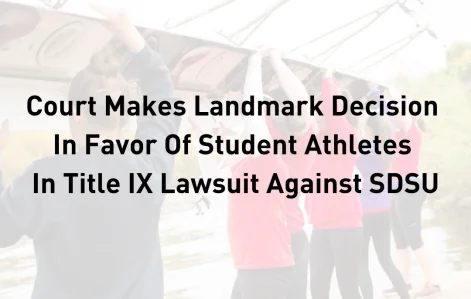It wasn’t until relatively recently that women throughout the United States received the workplace rights and protections they should have had from the beginning. That said, women in California may be uniquely protected compared to other states. While each law we’ll discuss below exists on a federal level, California has – in some cases – built upon what federal laws provide to give women extended protections throughout the state.
Please read on below and reach out to Haeggquist & Eck, LLP if you believe your rights at work have been violated. Our firm’s employment law practice stands up for women in the workplace and the unique issues that affect them. We offer a free consultation that you can use to learn more about legal options we can help you take advantage of and pursue fair and just compensation.
Contact us online or call (619) 342-8000 to speak with someone who can help you arrange your complimentary consultation with one of our lawyers.
1. Title VII of the 1964 Civil Rights Act
Title VII of the 1964 Civil Rights Act – a federal law – prohibits, among other protected classes, sex-based discrimination against employees and job applicants. It also lays the groundwork necessary to define certain business practices and treatment at work – such as paying women less than men or sexual harassment – as prohibited sex discrimination. As a result, laws have been passed and U.S. Supreme Court cases have been decided using Title VII as a precedent to expand or affirm certain women’s rights.
2. The California Equal Pay Act
The California Equal Pay Act has prohibited employers for decades from paying its employees less than employees of the opposite sex for equal work. However, in 2015, Governor Brown signed the California Fair Pay Act, which strengthened the Equal Pay Act in a number of ways. For more details on the California Equal Pay Act, and differences between it and the federal Equal Pay Act of 1963, see our previous article.
The California Equal Pay Act prohibits an employer from paying its employees less than employees of the opposite sex, or of another race, or of another ethnicity for substantially similar work. It also provides that employees don’t have to be working the exact same job to be paid the same, they just need to be performing “substantially similar work.” Lastly, employers are prohibited from using prior salary to justify any sex-, race-, or ethnicity-based pay difference.
3. The Pregnancy Discrimination Act of 1978 & California Pregnancy Disability Leave Act
Although, there are many federal and state laws that address pregnancy, including the Family Medical Leave Act (FMLA) and Americans with Disabilities Act, we will jfocus on the Pregnancy Discrimination Act of 1978 and California’s Pregnancy Disability Leave Act.
The Pregnancy Discrimination Act is an amendment to the Civil Rights Act of 1964 and prohibits discrimination based on pregnancy, childbirth, or related medical conditions.
The Act prohibits employers nationwide from making any decisions regarding someone’s employment based on:
- A current or previous pregnancy
- Potential or intent to become pregnant
- A medical condition related to pregnancy
- A decision to have/not have an abortion
Under the FMLA, employees are entitled to up to 12 weeks of unpaid, job-protected leave for pregnancy and childbirth. In California, pregnant employees can potentially use both FMLA leave and pregnancy disability leave.
The California Pregnancy Disability Leave Act provides employees the following:
- Four weeks of leave prior to birth
- Six weeks of leave after vaginal birth; eight weeks after caesarean section
- Temporary disability insurance benefits
- California Paid Family Leave benefits
4. California Family Rights Act
The California Family Rights Act (CFRA) is essentially the state’s version of the Family Medical Leave Act (FMLA), discussed earlier. Like the FMLA, CFRA offers pregnancy and new-child bonding as qualifying reasons to take a certain amount of unpaid, job-protected leave. A new version of the California Family Rights Act was signed into law in 2020 and takes effect on Jan. 1, 2021.
Here are some of the new CFRA’s provisions as they pertain to pregnancy:
- Up to 24 weeks of unpaid, job-protected leave
- Employers with five or more employees are covered by this law
- Bonding leave expanded such that two parents working for the same employer may each take 12 weeks of parental leave
- Someone who is considered a key employee – is among the highest earners in the company – is protected, potentially protecting women in managerial and executive positions
5. Whistleblower Protection Act
Although not specific to women’s rights or issues that impact women, the Whistleblower Protection Act, and other laws that prohibit employers from retaliating against employees who report unlawful behavior, are crucial. Such laws protect those who report unlawful business activities or mistreatment, including that based on gender.
Do You Need Legal Help?
At Haeggquist & Eck, LLP, we advise and provide legal services for employees who have experienced violations of their rights at work. If you feel as if your rights are being violated, schedule a free initial consultation with one of our attorneys to discuss your situation.
After learning more about your concerns during this complimentary meeting, we may be able to provide options for how you can move forward with your claim.
Schedule your free consultation today by calling (619) 342-8000 or by contacting our legal team online.





